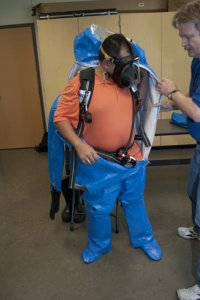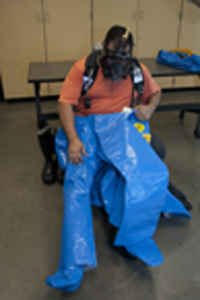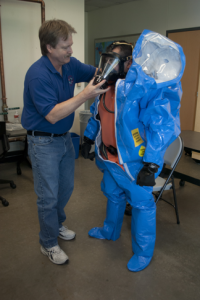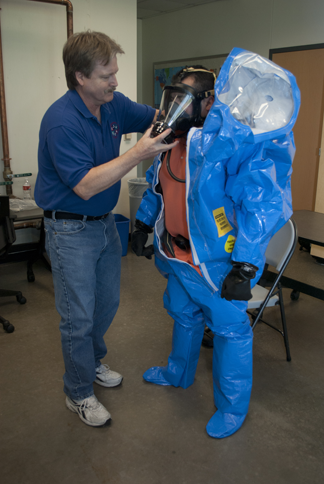By Shirlett Warren/ nw news editor
The workplace can be dangerous, but NW Campus’ occupational safety and environmental technology program focuses on equipping individuals to establish and maintain safe and healthy work environments.
NW public services and social/behavioral sciences dean Arrick Jackson said students are flocking to the program.

“Every industry has to have a safety program,” Jackson said. “They can’t survive without it.”
Everyday things like ladder placement, slips on stairs, seals on boxes and lock locations are all a part of safety training, he said.
“There’s a safety protocol,” Jackson said. “Police officers need to know how to handle blood at crime scenes. Hospitals need to know how to clean up spills or to not leave scalpels in bodies. Truckers need to know how to move hazardous materials safely through communities. Schools need to know how to evacuate buildings.”
NW instructor Rex Coffman said the program’s goal is to give students the knowledge and confidence needed to go into the health and safety field and care for the environment.
“I tell my students fortune really favors the prepared,” Coffman said. “While there are things in the workplace that can hurt, we give students the tools to go home at night the same way they came.”
The program offers two Associate of Applied Science degrees and two technician certifications. The certifications are also embedded in the degrees.
Many non-traditional students who have worked for years and earned lots of experience in a particular field are not looking to start from square one, Coffman said.
“We want to assist students not to re-cut ground in areas they’re already certified in,” he said. “We try to give them credit so they don’t have to spend time and money on courses and certificates they’ve already earned.”

Photos by David Reid/The Collegian
Students on the degree plans learn the distinctive responsibilities of the Environmental Protection Agency, the Department of Transportation, the Occupational Safety and Health Administration and the Texas Natural Resource Conservation Commission. Each group sets industry regulations and standards.
Coffman places a strong emphasis on hands-on learning.
“It’s one thing to see PowerPoints,” he said. “It’s another thing to actually hold equipment in your hands.”
Coffman also stresses the importance of strong communication. He uses a paper-tearing exercise where each student is given a blank piece of paper and told to fold it in half and tear a circle in the fold. Then, they fold the paper again and tear a square in the fold. The responses are all different, but the exercise is a fun way to teach students to be clear when they speak, he said.
“Our program makes use of firefighters because they’re usually the first responders to emergency situations,” Coffman said. “Environmentalists bring a different perspective. Having both perspectives is important, so they have to know how to communicate.”
Environmental associate professor Aline Williamson wants students in the program to be prepared for the workforce.
“We’re in a depressed economy, but the job market is excellent in this field,” Williamson

Photos by David Reid/The Collegian
said. “Anything you can think of has a health and safety component.”
Jackson said the program is the gateway to sustainability/green degrees and risk management degrees offered at four-year universities.
NW student Adam Traylor plans to get a degree.
“I’ve been a lifeguard for the City of Arlington for the past five summers,” he said. “I want to transition into the business of safety. It’s not a well-known field, but I have a cousin who got a job right out of college. I’d like to one day be a safety director for the City of Arlington or wherever it leads.”
Both Coffman and Williamson agree that students like Traylor make the program worthwhile.
“We have an opportunity to make a difference on a larger scale than just as individuals,” Williamson said. “What we do helps people be safe.”

